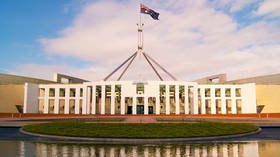China-Australia relations are deteriorating fast, and it’s Canberra’s loyalty to US and hostility to Beijing that’s to blame

As China considers a ban on coal from Australia, the government in Canberra faces a difficult dilemma. How does it keep Beijing – its biggest trading partner – happy, without upsetting its key security partner, the US?
Australia’s Foreign Ministry is urgently seeking clarification from China as to whether Beijing has asked a number of companies and ports to suspend coal imports from Down Under.
Although there has been no official confirmation from China, insider sources have caused alarm in the Canberra government, which has urged the Chinese to live up to the terms of their free trade agreement with Australia.
The move marks yet another step in the rapid deterioration of the relationship between the two countries, which has collapsed into freefall in 2020. If confirmed, the ban would not be the first measure taken against Australia, with China having also targeted barley and wine imports earlier this year.
What lies at the root of the problem? Despite the fact that China is its largest trading partner, since 2018 Australian politics has descended into a climate of paranoia and hysteria over its relationship with Beijing, encouraged by Washington, which has caused ill feeling among the Chinese.
The first country to ban Huawei from its 5G networks, Australia has continually raised fears of ‘Chinese influence’ at home and its national media has exhibited relentless negativity and sensationalism on the topic. As a result, Beijing has continually perceived Australia as being inherently loyal to US foreign policy objectives in the Indo-Pacific, and is taking an increasingly hard line against it.
Australia’s foreign policy is one that should be understood through the framework of history, culture, and basic geography. First of all, as an Anglosphere country originating from British colonialism, it has always been an inseparable component of the security sphere which the UK and US created in the early 20th century.
Australia would fight in World War I, and through the ANZACs and Gallipoli it established its own military tradition. In World War II, the country relied upon the US to fight Japan in the Pacific, which paved the way for Washington to replace Britain as its largest security partner.
Also on rt.com Quadruple trouble for China? Why Washington’s hopes of creating an anti-Beijing NATO-style bloc in the region is a pipe dreamAnd this is where geography comes into the equation. While Australia is a vast, imposing country spanning a continental landmass, in practice it is small in population and thus military clout. It relies on the US to uphold its security in the surrounding region, so it has been loyal to Washington in every venture it has undertaken in this part of the world.
So, while the UK boycotted the Vietnam War, for example, Australia joined in. However, this geographic consideration is where China also comes into play, as its proximity means it has quickly become a huge trade and investment partner. Enormous Chinese purchases of Australian mineral commodities allowed the country to avoid the great recession of 2008 and even prosper.
However, the growing economic role of China and its rise as a world power has subsequently begun to jar with Australia’s longstanding geopolitical alignment and Anglosphere identity.
Anti-China hysteria in Australia is not new. The term “yellow peril”was long associated with early 20th century Australia, which banned Asian immigration to the country and rendered it a threat to the way of life. This inherently racist undertone continues to motivate the discourse against China. Australian-Chinese MPs have been repeatedly accused of being associated with the Communist party, showing how the anti-Beijing culture far transcends reason.
Not surprisingly, China disapproves of a country which is profiting enormously from it yet placing itself in a position of open hostility. China perceives that Australia has subsequently become a key pillar in an ‘anti-China’ alliance which includes the Five Eyes countries, and therefore has sought to push back against Canberra’s activities by taking aim at its most valuable exports.
The Chinese strategy is essentially to impose costs on Australia for moving too close to the US and push for a moderation in its position. This, of course, creates an incredibly difficult dilemma for Australia itself, as it is being squeezed by its largest security provider and also its largest market and customer.
The Scott Morrison government has not balanced its priorities well and his handling of the situation is inviting criticism. Yet with society growing more hostile towards Beijing and the media whipping up the antipathy, there is no easy way out.
In essence, the situation in Australia might be described as the most clear and explicit reaction yet of the discomfort in the Anglophone world caused by the rise of China as a superpower state. As China is not going to allow itself to be bullied into submission by the West and attempts to thwart its rise are unlikely to work, Australia might just have to learn to live with it.
Think your friends would be interested? Share this story!
The statements, views and opinions expressed in this column are solely those of the author and do not necessarily represent those of RT.















